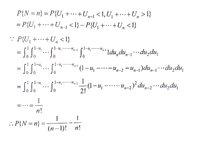habibito01
New member
- Joined
- Jun 23, 2021
- Messages
- 2
Question
Let U1,U2,U3,… be identical independent random numbers from a uniform (0,1) distribution.
Define N by N = minimum { n ∣ [MATH]\displaystyle \sum_{i=1}^n [/MATH]Ui > 1}.
Show that P(N>n) = [MATH]\frac{1}{n!}[/MATH]
I want to ask the question above, and what does "N by N = minimum { n ∣ [MATH]\displaystyle \sum_{i=1}^n [/MATH]Ui > 1} "mean?
Let U1,U2,U3,… be identical independent random numbers from a uniform (0,1) distribution.
Define N by N = minimum { n ∣ [MATH]\displaystyle \sum_{i=1}^n [/MATH]Ui > 1}.
Show that P(N>n) = [MATH]\frac{1}{n!}[/MATH]
I want to ask the question above, and what does "N by N = minimum { n ∣ [MATH]\displaystyle \sum_{i=1}^n [/MATH]Ui > 1} "mean?

